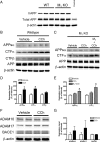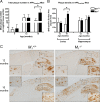Deletion of M1 muscarinic acetylcholine receptors increases amyloid pathology in vitro and in vivo
- PMID: 20335454
- PMCID: PMC2855655
- DOI: 10.1523/JNEUROSCI.6393-09.2010
Deletion of M1 muscarinic acetylcholine receptors increases amyloid pathology in vitro and in vivo
Abstract
Alzheimer's disease (AD) is a progressive neurological disorder that causes dementia and poses a major public health crisis as the population ages. Aberrant processing of the amyloid precursor protein (APP) is strongly implicated as a proximal event in AD pathophysiology, but the neurochemical signals that regulate APP processing in the brain are not completely understood. Activation of muscarinic acetylcholine receptors (mAChRs) has been shown to affect APP processing and AD pathology, but less is known about the roles of specific mAChR subtypes. In this study, we used M(1) mAChR knock-out mice (M(1)KO) to isolate the effects of the M(1) mAChR on APP processing in primary neurons and on the development of amyloid pathology in a transgenic mouse model of AD. We demonstrate that the loss of M(1) mAChRs increases amyloidogenic APP processing in neurons, as evidenced by decreased agonist-regulated shedding of the neuroprotective APP ectodomain APPsalpha and increased production of toxic Abeta peptides. Expression of M(1) mAChRs on the M(1)KO background rescued this phenotype, indicating that M(1) mAChRs are sufficient to modulate nonamyloidogenic APP processing. In APP(Swe/Ind) transgenic mice, the loss of M(1) mAChRs resulted in increased levels of brain Abeta and greater accumulation of amyloid plaque pathology. Analysis of APP metabolites in APP(Swe/Ind) brain tissue indicates that the loss of M(1) mAChRs increases amyloidogenic APP processing. These results indicate that the M(1) mAChR is an important regulator of amyloidogenesis in the brain and provide strong support for targeting the M(1) mAChR as a therapeutic candidate in AD.
Figures




Similar articles
-
The metalloprotease inhibitor TIMP-3 regulates amyloid precursor protein and apolipoprotein E receptor proteolysis.J Neurosci. 2007 Oct 3;27(40):10895-905. doi: 10.1523/JNEUROSCI.3135-07.2007. J Neurosci. 2007. PMID: 17913923 Free PMC article.
-
Acute Effects of Muscarinic M1 Receptor Modulation on AβPP Metabolism and Amyloid-β Levels in vivo: A Microdialysis Study.J Alzheimers Dis. 2015;46(4):971-82. doi: 10.3233/JAD-150152. J Alzheimers Dis. 2015. PMID: 25881909
-
Deletion of Mint proteins decreases amyloid production in transgenic mouse models of Alzheimer's disease.J Neurosci. 2008 Dec 31;28(53):14392-400. doi: 10.1523/JNEUROSCI.2481-08.2008. J Neurosci. 2008. PMID: 19118172 Free PMC article.
-
The regulation of amyloid precursor protein metabolism by cholinergic mechanisms and neurotrophin receptor signaling.Prog Neurobiol. 1998 Dec;56(5):541-69. doi: 10.1016/s0301-0082(98)00044-6. Prog Neurobiol. 1998. PMID: 9775403 Review.
-
Therapeutic approaches to Alzheimer's disease through stimulating of non-amyloidogenic processing of amyloid precursor protein.Eur Rev Med Pharmacol Sci. 2016 Jun;20(11):2389-403. Eur Rev Med Pharmacol Sci. 2016. PMID: 27338066 Review.
Cited by
-
M1 muscarinic acetylcholine receptor in Alzheimer's disease.Neurosci Bull. 2014 Apr;30(2):295-307. doi: 10.1007/s12264-013-1406-z. Epub 2014 Mar 3. Neurosci Bull. 2014. PMID: 24590577 Free PMC article. Review.
-
Revisiting the Role of Acetylcholinesterase in Alzheimer's Disease: Cross-Talk with P-tau and β-Amyloid.Front Mol Neurosci. 2011 Sep 13;4:22. doi: 10.3389/fnmol.2011.00022. eCollection 2011. Front Mol Neurosci. 2011. PMID: 21949503 Free PMC article.
-
Changes in cortical gene expression in the muscarinic M1 receptor knockout mouse: potential relevance to schizophrenia, Alzheimer's disease and cognition.NPJ Schizophr. 2021 Sep 14;7(1):44. doi: 10.1038/s41537-021-00174-z. NPJ Schizophr. 2021. PMID: 34521861 Free PMC article.
-
Alzheimer's disease is an inherent, natural part of human brain aging: an integrated perspective.Free Neuropathol. 2022 Jul 8;3:17. doi: 10.17879/freeneuropathology-2022-3806. eCollection 2022 Jan. Free Neuropathol. 2022. PMID: 37284149 Free PMC article.
-
Removal of p75 Neurotrophin Receptor Expression from Cholinergic Basal Forebrain Neurons Reduces Amyloid-β Plaque Deposition and Cognitive Impairment in Aged APP/PS1 Mice.Mol Neurobiol. 2019 Jul;56(7):4639-4652. doi: 10.1007/s12035-018-1404-2. Epub 2018 Oct 29. Mol Neurobiol. 2019. PMID: 30374941
References
-
- Alzheimer's Association. 2009 Alzheimer's disease facts and figures. Alzheimers Dement. 2009;5:234–270. - PubMed
-
- Anagnostaras SG, Murphy GG, Hamilton SE, Mitchell SL, Rahnama NP, Nathanson NM, Silva AJ. Selective cognitive dysfunction in acetylcholine M1 muscarinic receptor mutant mice. Nat Neurosci. 2003;6:51–58. - PubMed
-
- Beach TG, Potter PE, Kuo YM, Emmerling MR, Durham RA, Webster SD, Walker DG, Sue LI, Scott S, Layne KJ, Roher AE. Cholinergic deafferentation of the rabbit cortex: a new animal model of Abeta deposition. Neurosci Lett. 2000;283:9–12. - PubMed
-
- Beach TG, Kuo YM, Schwab C, Walker DG, Roher AE. Reduction of cortical amyloid beta levels in guinea pig brain after systemic administration of physostigmine. Neurosci Lett. 2001a;310:21–24. - PubMed
-
- Beach TG, Walker DG, Potter PE, Sue LI, Fisher A. Reduction of cerebrospinal fluid amyloid beta after systemic administration of M1 muscarinic agonists. Brain Res. 2001b;905:220–223. - PubMed
Publication types
MeSH terms
Substances
Grants and funding
LinkOut - more resources
Full Text Sources
Other Literature Sources
Molecular Biology Databases
Research Materials
